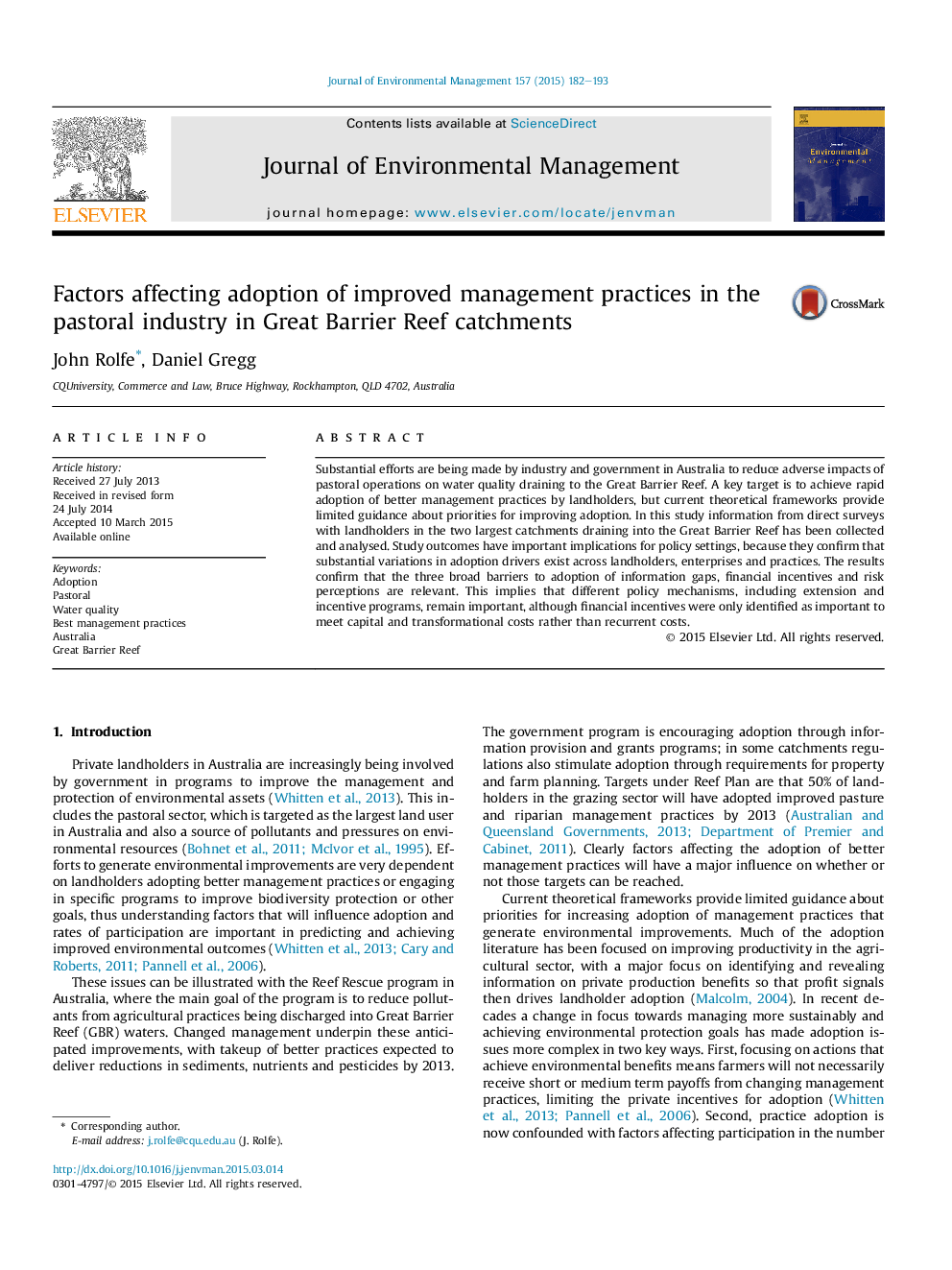| کد مقاله | کد نشریه | سال انتشار | مقاله انگلیسی | نسخه تمام متن |
|---|---|---|---|---|
| 7482230 | 1485255 | 2015 | 12 صفحه PDF | دانلود رایگان |
عنوان انگلیسی مقاله ISI
Factors affecting adoption of improved management practices in the pastoral industry in Great Barrier Reef catchments
ترجمه فارسی عنوان
عوامل موثر بر پذیرش شیوه های مدیریتی بهبود یافته در صنایع گوشتی در حوضه های بزرگ سد بزرگ
دانلود مقاله + سفارش ترجمه
دانلود مقاله ISI انگلیسی
رایگان برای ایرانیان
کلمات کلیدی
تصویب، معنوی، کیفیت آب، بهترین شیوه های مدیریت، استرالیا، ریف بزرگ سد،
ترجمه چکیده
تلاش های صنعتی و دولتی در استرالیا به منظور کاهش اثرات نامطلوب عملیات خوارزمی در تخلیه کیفیت آب به ریف بلور بزرگ انجام شده است. یک هدف کلیدی برای دستیابی سریع به شیوه های مدیریت بهتر توسط صاحبان زمین است، اما چارچوب نظری فعلی راهنمایی های محدودی در مورد اولویت ها برای بهبود پذیرش ارائه می دهد. در این مطالعه اطلاعاتی از نظرسنجی مستقیم با صاحبان زمین در دو حوضه بزرگ حوضه جمع آوری شده و تجزیه و تحلیل شده است. نتایج مطالعه نتایج مهمی برای تنظیمات سیاست دارد، زیرا آنها تأیید می کنند که تغییرات قابل توجهی در رانندگان تصویب وجود دارد در میان صاحبان زمین، شرکت ها و شیوه ها. نتایج حاکی از آن است که سه موانع بزرگ برای پذیرش شکاف اطلاعات، مشوق های مالی و درک ریسک مربوطه است. این بدان معنی است که مکانیسم های سیاست های مختلف، از جمله برنامه های گسترش و انگیزشی، همچنان مهم هستند، گرچه مشوق های مالی تنها به عنوان هزینه های سرمایه گذاری و تحرک پذیری به جای هزینه های عادی شناخته شده اند.
موضوعات مرتبط
مهندسی و علوم پایه
مهندسی انرژی
انرژی های تجدید پذیر، توسعه پایدار و محیط زیست
چکیده انگلیسی
Substantial efforts are being made by industry and government in Australia to reduce adverse impacts of pastoral operations on water quality draining to the Great Barrier Reef. A key target is to achieve rapid adoption of better management practices by landholders, but current theoretical frameworks provide limited guidance about priorities for improving adoption. In this study information from direct surveys with landholders in the two largest catchments draining into the Great Barrier Reef has been collected and analysed. Study outcomes have important implications for policy settings, because they confirm that substantial variations in adoption drivers exist across landholders, enterprises and practices. The results confirm that the three broad barriers to adoption of information gaps, financial incentives and risk perceptions are relevant. This implies that different policy mechanisms, including extension and incentive programs, remain important, although financial incentives were only identified as important to meet capital and transformational costs rather than recurrent costs.
ناشر
Database: Elsevier - ScienceDirect (ساینس دایرکت)
Journal: Journal of Environmental Management - Volume 157, 1 July 2015, Pages 182-193
Journal: Journal of Environmental Management - Volume 157, 1 July 2015, Pages 182-193
نویسندگان
John Rolfe, Daniel Gregg,
